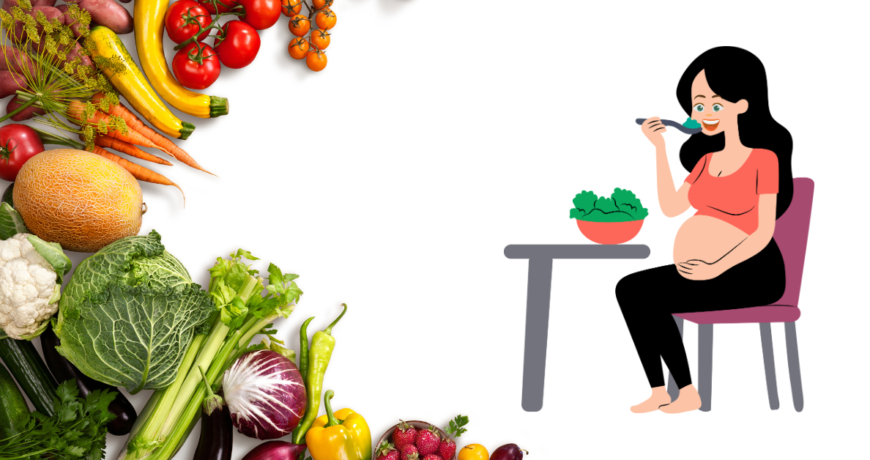Focus on Nutrient-Rich Whole Foods
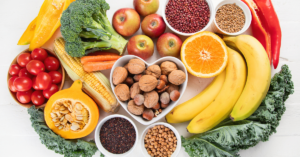
When crafting your healthy eating plan, prioritize whole foods that are packed with nutrients. These provide higher amounts of the good stuff you need more of during pregnancy, such as:
- Protein: Supports your baby’s growth and development.
- Vitamins and Minerals: Essential for your overall health.
- Healthy Fats: Important for your baby’s brain development.
- Complex Carbohydrates: Provide sustained energy to keep you going.
- Fiber and Fluids: Aid digestion and keep you hydrated.
You can get these nutrients by enjoying a wide variety of lean meats, seafood 🐟, whole grains, and plenty of fruits and vegetables 🥗.
Top 13 Nutritious Foods to Eat During Pregnancy
Ready to make every bite count? 🍽️ Here are 13 nutrient-packed foods to include in your diet to help ensure a healthy pregnancy journey.
Remember, always consult your healthcare provider before making significant changes to your diet. 😊
Dairy Products 🥛🧀
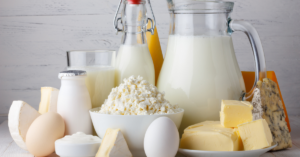
Yogurt, especially Greek yogurt, can be particularly beneficial. Some varieties are packed with probiotic bacteria that support digestive health—keeping your tummy happy! 😊 If you’re lactose intolerant, you may still be able to enjoy yogurt, especially probiotic yogurt. A study published in the Journal of Nutrition suggests that probiotic yogurt may improve lactose digestion.
Indian Dairy Delights 🇮🇳
In India, there are plenty of delicious dairy options that are both nutritious and satisfying:
- Paneer: A fresh cheese rich in protein and calcium, great in dishes like Palak Paneer.
- Dahi (Curd): Similar to yogurt, it’s a staple in Indian households and can be enjoyed on its own or in Raita.
- Lassi: A refreshing yogurt-based drink made with yogurt and spices—perfect for staying hydrated and getting those probiotics.
- Chaas (Buttermilk): A light, tangy drink that’s great for digestion.
- Kheer: A rice pudding made with milk, offering a sweet way to increase calcium intake.
If you’re looking for ways to include dairy in your diet, these Indian favorites can add both flavor and nutrition to your meals! 🥣
Remember, always check with your doctor before making significant changes to your diet, especially if you have lactose intolerance or other dietary concerns. 😊
Legumes 🌱

Legumes are a fantastic addition to your pregnancy diet! These include lentils, peas, beans, chickpeas, soybeans, and peanuts. They’re excellent plant-based sources of fiber, protein, iron, folate, and calcium—all of which your body needs more of during pregnancy.
Folate (Vitamin B9) is one of the most essential B vitamins. It’s incredibly important for you and your baby, especially during the first trimester, and even before conception. You’ll need at least 600 micrograms (mcg) of folate every day, which can be a challenge to achieve with foods alone. According to the Office of Dietary Supplements, folate plays a crucial role in preventing neural tube defects.
But here’s the good news: legumes can significantly boost your folate levels! Along with supplementation based on your doctor’s recommendation, incorporating legumes into your meals can help meet your folate needs.
Legumes are also high in fiber, and some are rich in iron, magnesium, and potassium. Consider adding legumes to your diet with delicious meals like:
- Hummus on whole grain toast 🥖
- Black beans in a taco salad 🥗
- A hearty lentil curry 🍛
Indian Legume Delights 🇮🇳
Looking for some Indian-inspired dishes? Here are some flavorful options:
- Dal: A variety of lentil soups or stews that are staples in Indian cuisine.
- Chana Masala: A spicy chickpea curry that’s both filling and nutritious.
- Rajma: Kidney bean curry that’s rich in protein and iron.
- Sambar: A South Indian lentil and vegetable stew packed with nutrients.
- Besan Chilla: Savory pancakes made from chickpea flour—perfect for a nutritious breakfast.
These dishes not only satisfy your taste buds but also contribute essential nutrients to your pregnancy diet! 🍽️
Remember to consult your healthcare provider before making significant changes to your diet or starting new supplements. 😊
Water 💧

Staying hydrated is essential for everyone, but it’s especially crucial during pregnancy. Did you know that during pregnancy, your blood volume increases by about 45%? 😲 According to the American Heart Association, this significant increase supports your baby’s growth and development.
You need plenty of water to prevent both you and your baby from becoming dehydrated. Symptoms of mild dehydration can include headaches, anxiety, tiredness, bad mood, and reduced memory—and nobody wants that!
Increasing your water intake may also help relieve constipation and reduce your risk of urinary tract infections (UTIs), which are common during pregnancy.
The American College of Obstetricians and Gynecologists recommends drinking 8–12 cups (64–96 ounces) of water per day during pregnancy. But the amount you really need can vary. It’s best to ask your doctor for a recommendation based on your specific needs.
Keep in mind that you also get water from other foods and beverages, such as fruits, vegetables, coffee, and tea.
Indian Hydration Tips 🇮🇳
Looking for delicious ways to stay hydrated? Here are some Indian-inspired options:
- Nimbu Pani: A refreshing lemonade made with water, lemon juice, and a pinch of salt.
- Coconut Water: Natural electrolyte-rich drink that’s great for hydration.
- Buttermilk (Chaas): A light, tangy yogurt-based drink that aids digestion.
- Fresh Fruit Juices: Homemade juices from watermelon, oranges, or pomegranate.
- Herbal Teas: Infusions like ginger tea or tulsi tea can be hydrating and soothing.
Pro Tip: Try keeping a reusable water bottle on hand so that you can quench your thirst throughout the day. Staying hydrated has never been easier! 🚰
Remember, always consult your healthcare provider before making significant changes to your diet or hydration habits. 😊
Fish Liver Oil 🐟
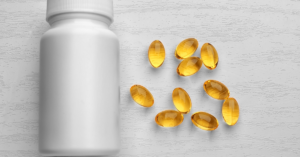
Fish liver oil, usually derived from the oily livers of fish like cod, is a powerhouse of nutrition for expecting mothers! It’s rich in omega-3 fatty acids EPA and DHA, which are essential for fetal brain and eye development. 🧠👀
Supplementing with fish oil may help protect against preterm delivery and benefit your baby’s eye development. Plus, fish liver oil is very high in vitamin D, a nutrient many people lack. It’s especially beneficial if you don’t regularly eat seafood or supplement with omega-3 or vitamin D.
A tablespoon (4.5 grams) of fish liver oil provides:
- 11 micrograms (mcg) of vitamin D—around three-quarters of your daily needs!
- 1,350 mcg of vitamin A—that’s around 150% of your daily needs.
But here’s a word of caution: too much vitamin A or D can be dangerous. High levels of omega-3 may also have blood-thinning effects. So, it’s important to speak with your doctor before using fish liver oil or other omega-3 supplements.
Indian Omega-3 Rich Foods 🇮🇳
If you’re looking for natural ways to boost your omega-3 levels, consider these low-mercury fish:
- Rohu: A popular freshwater fish in India rich in omega-3 fatty acids.
- Hilsa: Another Indian fish that’s both delicious and nutritious.
- Sardines (Mathi): Easily available and packed with omega-3s.
- Salmon: While not native, it’s increasingly available in India and is a great source of omega-3.
Not a fan of fish? You can also get omega-3s from plant-based sources like:
- Flaxseeds (Alsi): Sprinkle them on your cereal or blend into smoothies.
- Walnuts (Akhrot): A great snack to munch on!
- Chia Seeds: Add them to yogurt or make chia pudding.
Remember, always consult your healthcare provider before adding new supplements or making significant changes to your diet. 😊
Dried Fruit 🍇🍑
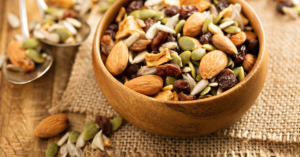
Dried fruits are a nutrient-packed snack that’s perfect for expecting moms! They are generally high in calories, fiber, and various vitamins and minerals. One piece of dried fruit contains the same amount of nutrients as fresh fruit, just without all the water, making it a compact source of energy.
A single serving can boost your intake of essential nutrients like folate, iron, and potassium—all important during pregnancy.
For example:
- Prunes are rich in fiber, potassium, and vitamin K. They’re natural laxatives and may be very helpful in relieving constipation.
- Dates are high in fiber, potassium, iron, and beneficial plant compounds.
However, keep in mind that dried fruits also contain high amounts of natural sugars, and the candied varieties have added sugars. So, enjoy them in moderation!
Indian Dried Fruit Favorites 🇮🇳
In India, dried fruits are widely enjoyed and can be easily incorporated into your diet:
- Raisins (Kishmish): Great for snacking or adding to dishes like kheer or biryanis.
- Figs (Anjeer): Rich in fiber and minerals, perfect as a snack or added to desserts.
- Apricots (Khumani): High in iron, they can be eaten on their own or included in fruit chaat.
- Dried Mango (Aam Papad): A tangy treat, but watch out for added sugars.
Pro Tip: Try adding a small portion of dried fruits to a trail mix with nuts and seeds for an on-the-go protein- and fiber-filled snack! 🥜🌰
Remember, moderation is key, and it’s always a good idea to consult your healthcare provider about your diet during pregnancy. 😊
Avocados 🥑
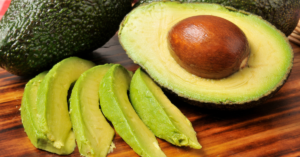
Avocados are a nutrient-packed superfood that’s perfect for expecting moms! They contain monounsaturated fatty acids (source), which give them that buttery and rich taste—ideal for adding depth and creaminess to any dish.
These green gems also provide:
- Fiber
- Antioxidants
- B vitamins (especially folate)
- Vitamin K
- Potassium
- Copper
- Vitamin E
- Vitamin C
Because of their high content of healthy fats, folate, and potassium, avocados are a fantastic choice during pregnancy. Here’s why:
- Healthy fats help build the skin, brain, and tissues of your little one.
- Folate may help prevent neural tube defects and developmental abnormalities of the brain and spine, such as spina bifida.
- Potassium may help relieve leg cramps, which can affect some people during pregnancy. Fun fact: avocados contain more potassium than bananas! 🍌 (Source)
Indian Ways to Enjoy Avocados 🇮🇳
Avocados are becoming increasingly popular in India, and there are many delicious ways to include them in your diet:
- Avocado Paratha: Mash avocados and mix them into your paratha dough for a nutritious twist.
- Guacamole with Indian Spices: Add cumin, coriander, and chili to your guacamole for extra flavor. Enjoy it with whole-grain roti or as a dip with veggie sticks.
- Avocado Salad: Combine diced avocados with tomatoes, onions, cucumbers, and a dash of chaat masala.
- Smoothies: Blend avocados with fruits like mango or banana for a creamy, energy-boosting smoothie.
- Avocado Toast: Spread mashed avocado on whole wheat toast, sprinkle some chili flakes, and top with a poached egg for added protein.
You can even use avocados as a substitute for mayo or sour cream in various recipes, making your meals both healthier and tastier!
Whole Grains 🌾
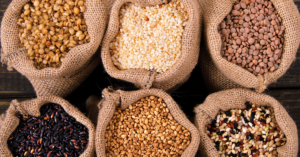
Whole grains are a nutritious powerhouse that you definitely want on your plate during pregnancy! Unlike their refined counterparts, whole grains are packed with fiber, vitamins, and beneficial plant compounds. Think oats, quinoa, brown rice, wheat berries, and barley instead of white bread, pasta, and white rice.
Some whole grains, like oats and quinoa, also contain a fair amount of protein, as well as B vitamins, fiber, and magnesium—all essential nutrients for you and your baby.
There are countless ways to add whole grains to any meal. Why not try:
- Quinoa and Roasted Sweet Potato Bowl: A delightful mix of flavors and textures that’s both satisfying and nutritious.
- Oatmeal Porridge: Start your day with a warm bowl topped with fruits and nuts.
- Brown Rice Stir-Fry: Swap white rice for brown in your favorite stir-fry recipes.
Indian Whole Grain Favorites 🇮🇳
In India, whole grains have been a staple for centuries. Here are some delicious ways to enjoy them:
- Daliya (Broken Wheat Porridge): A hearty breakfast option that’s high in fiber.
- Ragi (Finger Millet) Dishes: Enjoy ragi dosas, rotis, or puddings—rich in calcium and iron.
- Jowar (Sorghum) Rotis: A gluten-free alternative that’s filling and nutritious.
- Bajra (Pearl Millet) Khichdi: A comforting dish that’s perfect for lunch or dinner.
- Whole Wheat Parathas: Stuff them with veggies or paneer for an extra nutrient boost.
By incorporating these wholesome grains into your meals, you’re not only adding variety but also boosting your nutrient intake—benefiting both you and your little one! 🍽️
Remember, always consult your healthcare provider before making significant changes to your diet during pregnancy. 😊
Berries 🍓
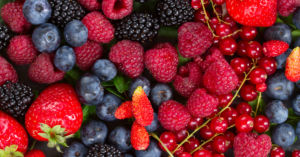
Berries are a delicious and nutritious snack that’s perfect for pregnant women! They provide water, healthy carbohydrates, vitamin C, fiber, and antioxidants. Plus, they have a relatively low glycemic index, so they won’t cause significant spikes in your blood sugar levels.
These little gems are great because they offer a lot of flavor and nutrition but with relatively few calories. This means you can enjoy them without worrying about excessive calorie intake. 😊
Some of the best berries to eat while pregnant include:
- Blueberries
- Raspberries
- Goji berries
- Strawberries
- Acai berries
Why not whip up a tasty blueberry smoothie for some inspiration? It’s a refreshing way to get those nutrients in! 🥤
Indian Berry Delights 🇮🇳
In India, you can enjoy a variety of local berries and incorporate them into your diet:
- Indian Gooseberry (Amla): Rich in vitamin C and antioxidants; can be eaten raw, as a juice, or in Amla Murabba.
- Mulberries (Shehtoot): A sweet treat that’s high in nutrients; enjoy them fresh or in desserts.
- Jamun (Java Plum): Helps in digestion and is low in sugar; perfect for snacking or making Jamun juice.
- Strawberry Lassi: Blend strawberries with yogurt for a delicious and cooling drink.
- Berry Chaat: Mix different berries with a sprinkle of chaat masala for a tangy twist.
Pro Tip: Keep a bowl of fresh berries on hand for easy snacking, or add them to your breakfast cereal, oatmeal, or yogurt for an extra nutrient boost! 🍓🥣
Remember, always consult your healthcare provider before making significant changes to your diet during pregnancy. 😊
Lean Meats and Proteins: Powering Your Pregnancy 🍗
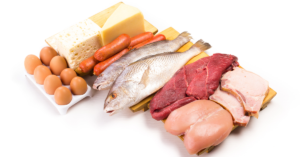
Lean beef, chicken, and fish are excellent sources of high-quality protein! Protein is essential for your baby’s growth and development. Beef is also rich in iron, choline, and other B vitamins—nutrients you’ll need in higher amounts during pregnancy.
Iron is a crucial mineral used by red blood cells to form hemoglobin. You’ll need more iron since your blood volume increases during pregnancy, especially in your third trimester.
👉 Did you know? Low levels of iron during early and mid-pregnancy may cause iron deficiency anemia, which increases the risk of low birth weight and other complications (Study on Iron Deficiency Anemia).
Meeting your iron needs with meals alone can be challenging, especially if you develop an aversion to meat or follow a plant-based diet. However, for those who can, lean red meat like beef or mutton can help boost the amount of iron you’re getting from food.
Indian Protein-Rich Delights 🇮🇳
Looking to incorporate lean proteins into your diet with an Indian twist? Try:
- Chicken Tikka: Marinated grilled chicken that’s flavorful and protein-rich.
- Grilled Fish (Tandoori Fish): Rich in protein and omega-3 fatty acids.
- Mutton Curry: Lean cuts of goat meat provide iron and protein.
Prefer vegetarian options? No worries! Here are some plant-based protein sources:
- Paneer (Cottage Cheese): High in protein and calcium.
- Lentils (Dal): A great source of protein and iron.
- Chickpea Curry (Chana Masala): Packed with protein and fiber.
Pro Tip: Pairing iron-rich foods with vitamin C can help increase iron absorption! 🍊 Add foods like oranges, bell peppers, or tomatoes to your meals.
For example:
- Toss some vitamin C-rich tomato slices on your grilled chicken sandwich 🥪.
- Enjoy a spinach and orange salad 🥗.
- Whip up a stir-fried paneer with bell peppers for a nutrient-packed meal.
Remember, always consult your healthcare provider before making significant changes to your diet during pregnancy. 😊
Broccoli and Dark, Leafy Greens 🥦🥬

Broccoli and dark, green vegetables like kale and spinach are packed with many of the nutrients you’ll need during pregnancy! If you don’t love their flavors, no worries—you can disguise them by adding them to soups, pasta sauces, and more. 🍲🍝
These nutrient powerhouses offer:
- Fiber
- Vitamin C
- Vitamin K
- Vitamin A
- Calcium
- Iron
- Folate
- Potassium
Their high fiber content can also help prevent constipation, a common concern during pregnancy.
Interesting Fact: Vegetables have also been linked to a reduced risk of low birth weight in babies! 🌟 According to a study published in the American Journal of Clinical Nutrition, increased vegetable intake during pregnancy can positively impact birth weight.
Delicious Ways to Enjoy Them 🍽️
- Kale Eggs Florentine: Try this tasty twist on a classic breakfast dish.
- Green Smoothies: Blend some spinach into a smoothie—you won’t even know it’s there! 🥤
Indian Spin on Leafy Greens 🇮🇳
Looking for some Indian-inspired ways to include these greens in your diet? Here are some delicious options:
- Palak Paneer: A creamy spinach curry with cubes of cottage cheese—rich in calcium and iron.
- Sarson ka Saag: Made from mustard greens and spinach, it’s a winter favorite in North India.
- Methi Paratha: Flatbreads stuffed with fresh fenugreek leaves.
- Broccoli Paratha: Grated broccoli mixed with spices and stuffed into whole wheat dough.
- Spinach and Lentil Dal: Add chopped spinach to your dal for an extra nutrient boost.
Pro Tip: Incorporate finely chopped greens into your chapati dough or idli batter to sneak in those veggies without altering the taste too much! 😉
Eggs 🥚
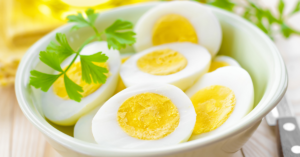
Eggs are a nutritional powerhouse, containing a little of almost every nutrient you need! A large egg has about 71 calories, 3.6 grams of protein, healthy fats, and many vitamins and minerals. (Nutrient Details)
One of the standout nutrients in eggs is choline, which is vital during pregnancy. Choline plays a crucial role in your baby’s brain development and helps prevent developmental abnormalities of the brain and spine, such as neural tube defects. 🧠
A single whole egg contains roughly 147 milligrams (mg) of choline, getting you closer to the current recommended intake of 450 mg per day during pregnancy. (Choline Information) While more studies are underway to determine if this amount is sufficient, including eggs in your diet can certainly help meet your choline needs.
Delicious and Healthy Ways to Enjoy Eggs 🍳
- Spinach Feta Wraps: Scrambled eggs with spinach and feta cheese wrapped in a whole-grain tortilla—packed with protein and veggies!
- Chickpea Scramble: A vegetarian twist where eggs and chickpeas are cooked together with spices.
- Masala Omelette: An Indian favorite! Beat eggs with chopped onions, tomatoes, green chilies, and spices like turmeric and cumin.
- Egg Bhurji: The Indian version of scrambled eggs, cooked with onions, tomatoes, and fragrant spices.
- Egg Curry: Boiled eggs simmered in a rich tomato-based gravy—perfect with brown rice or whole-grain roti.
Pro Tip: Pair your egg dishes with whole grains and veggies to make them even more nutritious! For instance, enjoy your masala omelette with a side of whole wheat toast and a glass of fresh orange juice for that vitamin C boost. 🍊
Salmon 🐟

Craving something delicious and nutritious? Salmon is a fantastic addition to your pregnancy diet! Smoked on a whole wheat bagel, teriyaki grilled, or served with pesto, salmon is both versatile and flavorful. Plus, it’s rich in essential omega-3 fatty acids, which come with a host of benefits for you and your baby. 🧠👶
Omega-3s, found abundantly in seafood, help build the brain and eyes of your baby and may even help increase gestational length (Study Link).
While it’s important to be cautious with certain seafood during pregnancy due to mercury and other contaminants, salmon, sardines, and anchovies are considered safe to eat (FDA Guidelines).
However, it’s worth checking where the fish was sourced from, especially if it was locally caught. Opting for fresh salmon is best, as smoked seafood can carry a risk of listeria—a bacteria that can be harmful during pregnancy (Food Safety Information).
Fish to Avoid Due to High Mercury Levels ⚠️
It’s advisable to avoid high-mercury fish, including:
- Swordfish
- Shark
- King Mackerel
- Marlin
- Bigeye Tuna
- Tilefish from the Gulf of Mexico
Refer to the FDA’s guidelines for more information on safe fish consumption during pregnancy.
Indian Seafood Options 🇮🇳
In India, you can enjoy several low-mercury fish that are both delicious and safe during pregnancy:
- Rohu: A freshwater fish rich in omega-3s.
- Hilsa: Be cautious with the bones, but it’s nutritious and flavorful.
- Pomfret: A popular choice that’s low in mercury.
- Indian Mackerel (Bangda): High in omega-3 fatty acids.
Pro Tip: Always ensure the seafood is well-cooked to eliminate any potential bacteria or parasites. Cooking methods like grilling, baking, or steaming are excellent choices. 🍽️
Sweet Potatoes 🍠
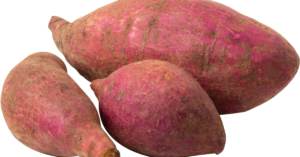
Sweet potatoes are a fantastic addition to your pregnancy diet! They’re rich in beta-carotene, a plant compound that your body converts into vitamin A—essential for your baby’s development. 🧡
But here’s something important: While vitamin A is crucial, getting too much from animal sources—like organ meats—can lead to toxicity (source). The good news? Sweet potatoes provide a safe, plant-based source of beta-carotene.
Plus, sweet potatoes are packed with fiber, which:
- Keeps you full longer
- Reduces blood sugar spikes
- Improves digestive health
- Helps reduce the risk of pregnancy constipation
Pro Tip: Try sweet potatoes at breakfast as a base for your morning avocado toast 🥑🍞. It’s a delicious and nutritious way to start your day!
Indian Ways to Enjoy Sweet Potatoes 🇮🇳
In India, sweet potatoes (known as shakarkandi) are popular and can be enjoyed in various delightful ways:
- Shakarkandi Chaat: Boiled sweet potatoes tossed with spices, lemon juice, and chaat masala—a tasty street food snack!
- Sweet Potato Paratha: Mash sweet potatoes into your paratha dough for a sweet and nutritious twist.
- Roasted Shakarkandi: Simply roast with a sprinkle of spices for a flavorful side dish.
- Sweet Potato Curry: Add chunks of sweet potato to your vegetable curry for extra nutrition and taste.
What Foods Should You Avoid During Pregnancy? 🚫
During pregnancy, it’s important to avoid foods that may contain harmful bacteria such as Listeria, E. coli, or Salmonella. These can pose risks to you and your baby.
Examples of Foods to Avoid (Source):
- Raw or Undercooked Meat, Fish, or Eggs: This includes sushi, raw oysters, rare meats, and runny eggs.
- High-Mercury Fish: Such as king mackerel, swordfish, shark, marlin, bigeye tuna, and tilefish.
- Raw Sprouts: Including alfalfa, mung bean, and other sprouts.
- Unpasteurized Milk, Juice, or Cider: These can contain harmful bacteria.
- Soft Cheeses and Pâtés: Unless labeled as made with pasteurized milk.
- Reheated Hot Dogs and Luncheon Meats: Unless heated until steaming hot.
- Raw Dough: Avoid tasting raw batter or dough that contains raw eggs or flour.
- Untreated Water: Always drink water from a safe source.
It’s also best to opt for fresh and varied foods without added sugars and unhealthy fats, and to limit your intake of processed foods.
Additionally, the Centers for Disease Control and Prevention (CDC) advises people not to consume alcohol during pregnancy, as it may be unsafe for your unborn child. (Learn More)
Pro Tip: Always consult your healthcare provider for personalized dietary advice during pregnancy. They can help tailor recommendations to your specific needs. 😊
What Foods Should You Eat Daily During Pregnancy? 🥗
Eating a variety of fresh fruits and vegetables, especially green leafy vegetables like kale and spinach, is essential during pregnancy. Make sure you get enough lean proteins, including oily fish like salmon and sardines, and low-fat yogurt for calcium and probiotics. If you’re on a plant-based diet, opt for tofu, lentils, nuts, and other plant-based protein-rich foods. Plus, don’t forget to drink plenty of water to stay hydrated! 💧
What Can Vegetarians and Vegans Eat During Pregnancy? 🌿🤰
If you’re vegan or vegetarian, it’s important to ensure you’re getting the right amounts of nutrients that are commonly found in animal products. These nutrients are crucial for both your health and your baby’s development. According to the NHS guidelines, key nutrients to focus on include:
- Protein
- Iron
- Vitamin B12
- Vitamin D
- Calcium
- Iodine
Plant-Based Sources of Essential Nutrients 🌱
Don’t worry! There are plenty of plant-based foods that can provide these vital nutrients:
- Tofu and Tempeh: Excellent sources of protein and calcium.
- Legumes: Lentils, chickpeas, and beans are rich in protein and iron.
- Dark Green Vegetables: Spinach, kale, and broccoli provide iron, calcium, and vitamin K.
- Fortified Foods: Plant-based milks (like soy milk) and cereals often fortified with vitamin B12, vitamin D, and calcium.
- Seeds and Nuts: Almonds, chia seeds, and flaxseeds offer healthy fats, calcium, and iron.
- Whole Grains: Quinoa, brown rice, and whole wheat are good sources of protein and iron.
- Dried Fruits: Apricots, figs, and raisins can boost your iron and calcium intake.
- Unsweetened Soy Drinks: Provide protein, calcium, and are often fortified with vitamins.
- Yeast Flakes (Nutritional Yeast): A great source of vitamin B12 when fortified.
Indian Plant-Based Delights 🇮🇳
Incorporate these nutritious foods into your meals with some delicious Indian recipes:
- Chana Masala: Chickpea curry rich in protein and iron.
- Palak Tofu Paneer: Substitute paneer with tofu in the classic spinach dish for extra calcium and iron.
- Masoor Dal: Red lentil soup packed with protein and essential minerals.
- Vegetable Biryani with Brown Rice: Whole grains and veggies make it nutrient-rich.
- Ragi Dosa: Made with finger millet, it’s high in calcium and iron.
- Soy Milk Chai: Enjoy your tea with fortified soy milk for added nutrients.
Pro Tip: Consider speaking with a healthcare provider or a registered dietitian to ensure you’re meeting all your nutritional needs during pregnancy. They might recommend supplements like vitamin B12 or iron if necessary.
Summary: Nourishing Your Pregnancy Journey 🤰🍏
During pregnancy, both you and your growing baby need nutrient-dense foods from a well-rounded eating plan. This includes plenty of whole grains, fruits and veggies, lean proteins, and healthy fats. 🥦🍞🥑
Partner with Your Healthcare Team 👩⚕️
Always consult your healthcare provider for personalized recommendations. Keep them informed about your eating choices, and let them guide you on any necessary supplements or dietary adjustments. They’re your best ally in ensuring a healthy pregnancy! 😊
Quick Tips for Foods to Eat When Pregnant 📝
- Dairy Products 🥛
- Benefit: Helps meet increased protein and calcium needs.
- Tip: Enjoy yogurt, especially Greek yogurt, for a probiotic boost.
- Legumes 🌱
- Benefit: Provide folate, fiber, and many other nutrients.
- Note: Folate is a very important nutrient during pregnancy.
- Sweet Potatoes 🍠
- Benefit: Excellent source of beta-carotene, which transforms into vitamin A.
- Importance: Vitamin A is crucial for the growth and differentiation of cells in your growing baby.
- Salmon 🐟
- Benefit: Contains essential omega-3 fatty acids EPA and DHA.
- Bonus: It’s also a natural source of vitamin D.
- Note: Omega-3s are important for brain and eye development in your baby.
- Whole Eggs 🥚
- Benefit: Nutritious and increase overall nutrient intake.
- Highlight: Contain choline, essential for brain health and development.
- Broccoli and Leafy Greens 🥦🥬
- Benefit: Packed with most of the nutrients you’ll need.
- Plus: Rich in fiber, which may help prevent or treat constipation.
- Lean Meat 🍗
- Benefit: Excellent source of high-quality protein.
- Additional Nutrients: Beef and pork are rich in iron, choline, and B vitamins.
- Berries 🍓
- Benefit: Contain water, carbs, vitamin C, fiber, antioxidants, and plant compounds.
- Tip: May help increase your nutrient and water intake.
- Whole Grains 🌾
- Benefit: Packed with fiber, vitamins, and plant compounds.
- Nutrients: Rich in B vitamins, fiber, and magnesium.
- Avocados 🥑
- Benefit: High in monounsaturated fatty acids, fiber, folate, and potassium.
- Bonus: May help relieve leg cramps.
- Dried Fruits 🍇
- Benefit: Nutrient-dense snack option.
- Caution: Limit portions and avoid candied varieties to prevent excess sugar intake.
- Water 💧
- Importance: Drinking water is crucial as your blood volume increases during pregnancy.
- Benefit: Adequate hydration may help prevent constipation and urinary tract infections.
Final Thoughts 🌟
Embarking on this pregnancy journey is both exciting and demanding. By focusing on these nutrient-rich foods, you’re taking vital steps toward a healthy, well-nourished pregnancy. Remember to stay connected with your healthcare team, listen to your body’s needs, and enjoy this special time! 🤰❤️


